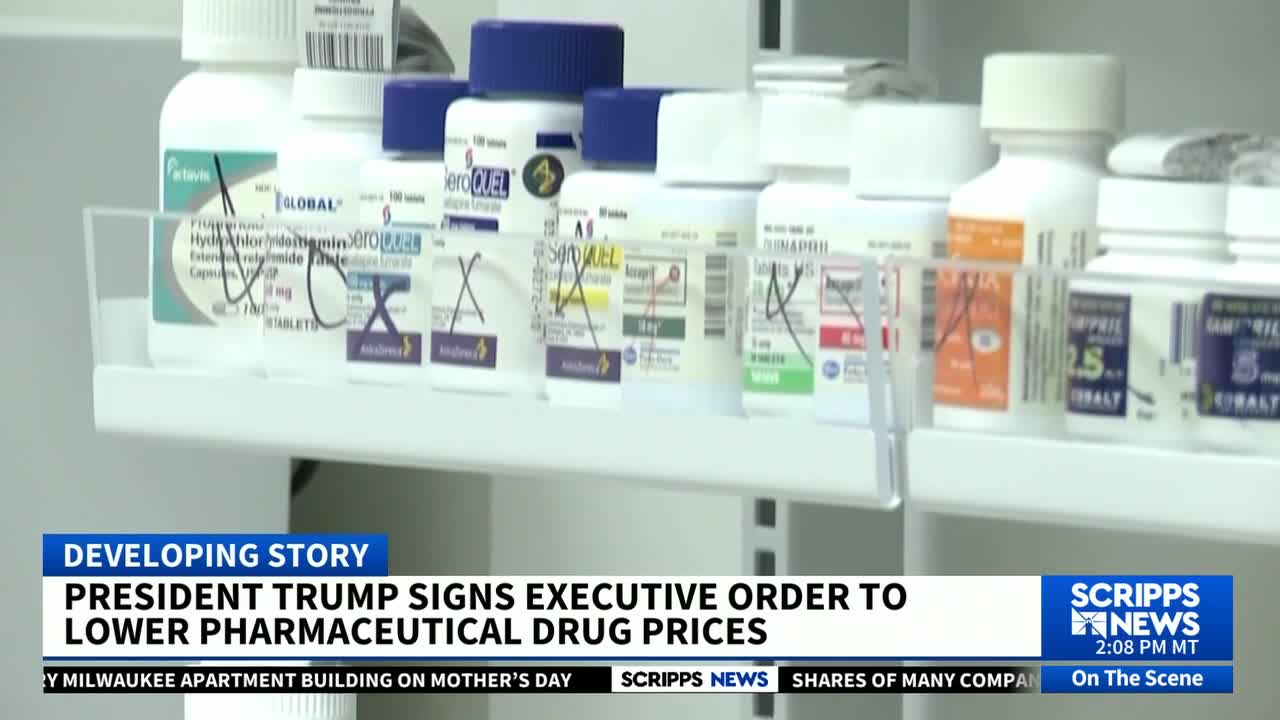President Donald Trump on Monday signed an executive order reviving a controversial plan to lower prescription drug costs by linking the price of certain medications in the U.S. to their lower prices in other countries.
But the feasibility and impacts of Trump’s so-called “most favored nations" policy remain unclear, as some experts claim the order is unlikely to achieve what it promises and pharmaceutical groups consider legal challenges to it.
Speaking from the Roosevelt Room alongside Health and Human Services Secretary Robert F. Kennedy Jr., Centers for Medicare and Medicaid Administrator Mehmet Oz and National Institutes of Health Administrator Jay Bhattacharya, Trump promised his action would reduce prices for some prescription medications “almost immediately by 50 to 80 to 90 percent.”
“Big Pharma will either abide by this principle voluntarily, or we'll use the power of the federal government to ensure that we are paying the same price as other countries,” Trump added.
RELATED STORY | FDA approves painkiller designed to eliminate the risk of addiction associated with opioids
His order directs the U.S. Trade Representative and Secretary of Commerce to “take all appropriate action” against “unreasonable or discriminatory” practices in foreign countries that suppress drug prices abroad. It also directs Kennedy to “facilitate” direct-to-consumer sales from pharmaceutical manufacturers when possible, bypassing insurance plans and pharmaceutical benefits managers, who serve as middlemen between insurance companies, unions, government agencies and consumers.
Yet despite Trump’s promise of immediate relief, Americans are unlikely to benefit from price reductions for at least several months, if at all. While President Trump’s order requires his top health officials to identify and share specific drugs targeted for price reductions within 30 days, that only begins what is likely to be a drawn-out negotiation process with pharmaceutical companies over drug costs. White House officials have yet to detail how such negotiations are expected to take place, though they said agencies will attempt to implement the "most favored nation" pricing via rulemaking if “adequate progress” in negotiations is not reached.
At this juncture, it remains unclear how impactful Trump’s move will be. White House officials declined to detail any specific drugs that may be targeted for lowering, though they did note GLP-1 weight loss drugs, the likes of Ozempic and Wegovy, are expected to be included.
“It's not entirely clear which drugs [will be impacted], how the drugs would be selected, whether all drugs would included, and that makes it really hard to understand what the impact is going to be,” said Tricia Neuman, a senior vice president at KFF and the executive director of its Program on Medicare Policy. “It could either have a sweeping impact on the drug industry, drug prices, access to medication if it’s fully implemented for all drugs. Alternatively, it could be implemented in a relatively modest way, which may not have a decipherable effect for people.”
RELATED STORY | FTC sues pharmaceutical middlemen, claiming practices inflated insulin cost
During his first term in office, President Trump attempted to implement a similar model policy, albeit smaller in scope. CMS officials estimated then that the plan would save the government about $85 billion, though some of those savings came from Americans losing access to certain medications under the assumption some manufacturers would rather pull their drugs from the U.S. market than lower prices.
A White House official told Scripps News that Trump’s new executive order is “broader” than his first administration’s attempt, adding that concerns about loss of access to drugs are “no longer relevant due to changes in law that have happened since 2020.”
On Capitol Hill, President Trump’s announcement received expected partisan reactions; praise from Republicans touting Trump’s efforts and criticism from Democrats who suggested it amounted to little more than bluster.
Pharmaceutical companies, meanwhile, blasted the announcement and spoke of possible legal challenges to it. During President Trump’s first term, a coalition of manufacturers and industry groups successfully challenged the "most favored nation" policy in federal court, with a Maryland judge blocking it from taking effect after President Trump left office.
The Biden administration opted not to defend the "most favored nation" model, opting instead to pursue price negotiations through the Inflation Reduction Act.
PhRMA, the pharmaceutical industry’s biggest lobbying group, declined to speak to whether the organization would again challenge the policy in court but was highly critical of the announcement in a press statement.
“Importing foreign prices from socialist countries would be a bad deal for American patients and workers,” CEO Stephen Ubl said. “It would mean less treatments and cures and would jeopardize the hundreds of billions our member companies are planning to invest in America.”
Still, other groups say they’re considering litigation. Andrew Spiegel, CEO of the Global Colon Cancer Association, a plaintiff in the successful lawsuit against Trump’s first "most favored nations policy," said his organization is “carefully reviewing the executive order and have not made any decisions regarding potential legal action.”
“This policy is deeply misguided and risks doing real harm to patients,” he added.
Asked about potential legal challenges, a White House official said the administration is “confident in the legality of this and every other EO by the President” and “ready to defend lowering drug prices for the American people in court.”




